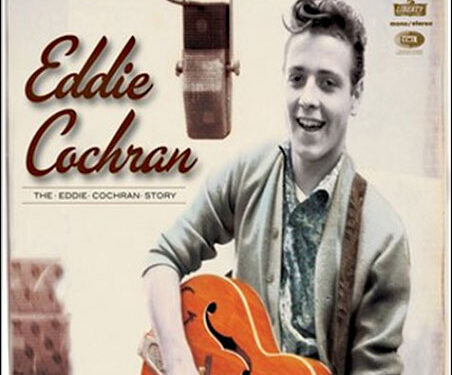 Eddie Cochran and his famed guitar
Eddie Cochran and his famed guitaron Oct. 3, it was the 73rd birthday of rock and roller Eddie Cochran, best known for the song “Summertimes Blues.” Or, at least, it would have been had Cochran not died in 1960. Belatedly, I want to take the anniversary of his birth to examine one of the most shocking legacies of his death, and relate the tale of his guitar.
Cochran, who was born in Albert Lea, Minn., in 1938 and lived there until he was 17, had an explosive, but limited, career as a recording artist and performer. This brief career possibly reached its peak when he appeared in the Jayne Mansfield comedy “The Girl Can’t Help It” in 1956, when he was just 18. In the film he played a rockabilly piece called “Twenty Flight Rock.” which he did with a slump and twitchy mannerisms that were meant to be tongue-in-cheek, as an illustration of the lack of ability required to become a success in rock and roll.
Instead, Cochran became something of a punk godfather, with his music recorded by many punk bands (including The Clash, The Ramones, and The Sex Pistols), and this performance became a protopunk classic. The song itself is an important footnote in history, since it is the tune that Paul McCartney played for John Lennon that convinced the 17-year-old Lennon that McCartney should be in his band, The Quarrymen.
Cochran’s career was cut short when he was killed in a vehicle crash while touring England; he was 21 years old, and his entire career had covered four years. He was in a car with his fiancée, Sharon Sheeley (a composer who subsequently wrote the Irma Thomas classic “Breakaway“), and Gene Vincent, a fellow rocker who was most famous for the song “Be Bop a Lula.” Sheeley and Vincent survived the accident. Vincent, however, was gravely hurt, and turned to alcohol to help control his pain, which played a big influence in his own early death at the age 36 in 1971.
Cochran’s injuries were more severe, and he died at St. Martin’s Hospital in Bath, England, which has some special resonance for me, given it’s only about five miles from where I lived in Bath as a youngster. His guitar, a modified 956 Gretsch 6120 Chet Atkins Western style, was impounded. Cochran had a lot of effect on future rockers, but we shall concern ourselves with the brief tale of his guitar, which, on the sole tour of England its owner would ever do, would have a weird power over those it touched.
First, we must mention the case of one Marc Feld, an Eastern London boy and the son of a lorry driver. The 13-year-old Feld met Cochran outside the Hackney Empire, a theater in the London borough of Hackney, where Cochran had just played a concert. Cochran allowed the boy to carry his guitar out to his limousine. Feld later renamed himself Dib Cochran and fronted a band called The Earwigs, although that was sort a joke name, an homage to the performer who had inspired him. Marc Feld was at this time already becoming famous under another stage name, Marc Bolan. With his band T. Rex, Bolan helped create glam rock, and the band enjoyed a top-10 hit in America with “Bang a Gong (Get It On).”
But that wasn’t the end of the drama of Cochran’s guitar. After his death, when the guitar was impounded in Wiltshire, a young policeman used it to teach himself how to play. That policeman’s name was David Harman, but he would soon alter his name to Dave Dee and cofound a band called Dave Dee, Dozy, Beaky, Mick & Tich. This band became one of the initial wave of the British Invasion, along with the Beatles. While Dave Dee, Dozy, Beaky, Mick & Tich never achieved much success in the U.S. (although the charted with “The Legend of Xanadu“), they lasted more weeks on the UK Singles Chart than The Beatles, and enjoyed unprecedented popularity abroad.
Eddie Cochran’s guitar is now on display at the Rock and Roll Hall of Fame in Cleveland, Ohio. It’s behind glass, as are all the objects in their collection of mementos, and this is probably for the best. Although the story of Cochran’s guitar is not very well-known, there is still a risk of hordes of West Country guys showing up to fondle the instrument in the hopes that it will kick-start their career. Heck, if I ever get out to Ohio, I’m going to attempt to get my hands on it, if only for a few moments, if only to pluck the legendary opening notes to “Summertime Blues.” There is some risk, of course – Marc Bolan, like Cochran, died in a vehicle crash when still quite young. But that’s how these thing work, isn’t it?

